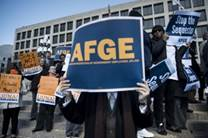
|
| Members of the American Federation of Government Employees (AFGE) gather outside the Department of Labor to protest the sequester on March 20, 2013, in Washington, D.C. |
|
Washington Post/Fed Page
By Joe Davidson
After a long struggle against strong head winds, federal labor leaders hope to finally catch a good backside breeze. They should find a friendly zephyr at their coming annual legislative conferences, like this week’s gathering of the American Federation of Government Employees, the largest federal union. With appearances Monday and Tuesday by key members of Congress, the union hopes to revitalize a membership and a workforce that has suffered a pretty good beating lately.
A new burst of energy might be needed to keep the AFGE growing. Compared with strong membership growth in past years, last year’s 2,098 increase — to a total of 284,630 — was anemic, .Of course, last year wasn’t a good year to recruit new dues-paying members. The freeze on basic federal pay rates was in its third year, wages for some feds were cut through furloughs and parts of the government closed for 16 days. “Federal employees had a great deal to be optimistic about after the departure of an administration bent on privatizing their jobs and diminishing their rights at work,” said AFGE President J. David Cox Sr. “They were ready to fight for a better tomorrow and joined the union at a remarkable clip. . . . AFGE put enormous resources into organizing in 2009.
“We have been to the brink of hell,” Cox said.
The AFGE needs 40,000 new members, replacing those who died, quit or retired, just to keep even. The 2013 increase didn’t provide much of a cushion compared with 2009, when membership jumped by 16,290. That increase — the most in the past 10 years — reflected the optimism federal employees felt with President Obama taking office, after eight years of a Republican administration that left many of them frustrated. The theme of the AFGE’s conference is “big enough to win.”
Winning isn’t the way to describe the austere period that the federal workforce has endured. Federal union victories mostly have been measured by how much worse things could have been for employees without organized efforts to protect them. Now the pay freeze is over and the recent budget agreement means increased employee stability. Yet Cox says that labor must continue to play defense.
“We’re facing gigantic battles,” he said during a telephone interview. He predicted that members of Congress would seek additional hits on federal employee retirement, warned about layoffs (such as those recently announced at the Office of Personnel Management, denounced overtime cuts at the Department of Homeland Security and criticized position downgrades at the Department of Veterans Affairs. “It’s just constant attacks,” he said.
Without the ability to strike or to bargain for wages and benefits, federal labor organizations don’t have the same arsenal that their union brothers and sisters in the private sector hold.
But the AFGE and other federal unions do have power. They push Democratic friends and their few Republican allies on Capitol Hill hard, insisting that Congress stop targeting federal compensation. They reward politicians with financial and organizational support at election time. They press the friendly Obama administration to be a better friend. They employ a busy media operation and try to get taxpayers on their side with public relations efforts.
“In spite of their limited tool box, today’s federal unions play a key role in the work life of every federal employee through their ability to reach and communicate with elected officials, agency heads and political appointees,” said Janice R. Lachance, an OPM director during the Clinton administration and a former AFGE official who now is chief executive of the Special Libraries Association. “Being the voice of federal employees, who are a part of the workforce and local economy of every single congressional district across the country, strengthens federal unions and elevates their relevance,” she said. Increased cooperation between the two largest federal unions makes that voice stronger. Since Cox became president in 2012, the AFGE has strengthened its relationship with the National Treasury Employees Union , whose legislative conference begins Feb. 26.
“AFGE and NTEU work very, very strong together,” Cox said. “I consider (NTEU President) Colleen Kelley a good friend, a personal friend, and I feel it is mutual.” Kelley agreed and recalled the joint media briefing they held, at her invitation in December, on federal pension contributions. On that point, they and other employee leaders, along with congressional and administration supporters, were able to stop Republican plans to increase retirement contributions for workers hired before this year. Under the budget deal reached in December, however, new hires contribute more toward their retirement than those hired last year, who contribute more than those hired before that. This three-tier system aggravates union leaders, but at least the increases did not apply to employees already on the job.
“The unions are a potent force when it comes to public policy,” said Dan Blair, president and chief executive of the National Academy of Public Administration and an acting OPM director under President George W. Bush. “Through adversity they may find strength in the actions of the last few years,” he said, “and that’s what they are counting on to reinvigorate and reenergize their agenda.”
|


